
Proud of Our People! Anton Makarenko, Educator of Homeless Children
/ Главная / Russkiy Mir Foundation / Publications / Proud of Our People! Anton Makarenko, Educator of Homeless ChildrenProud of Our People! Anton Makarenko, Educator of Homeless Children
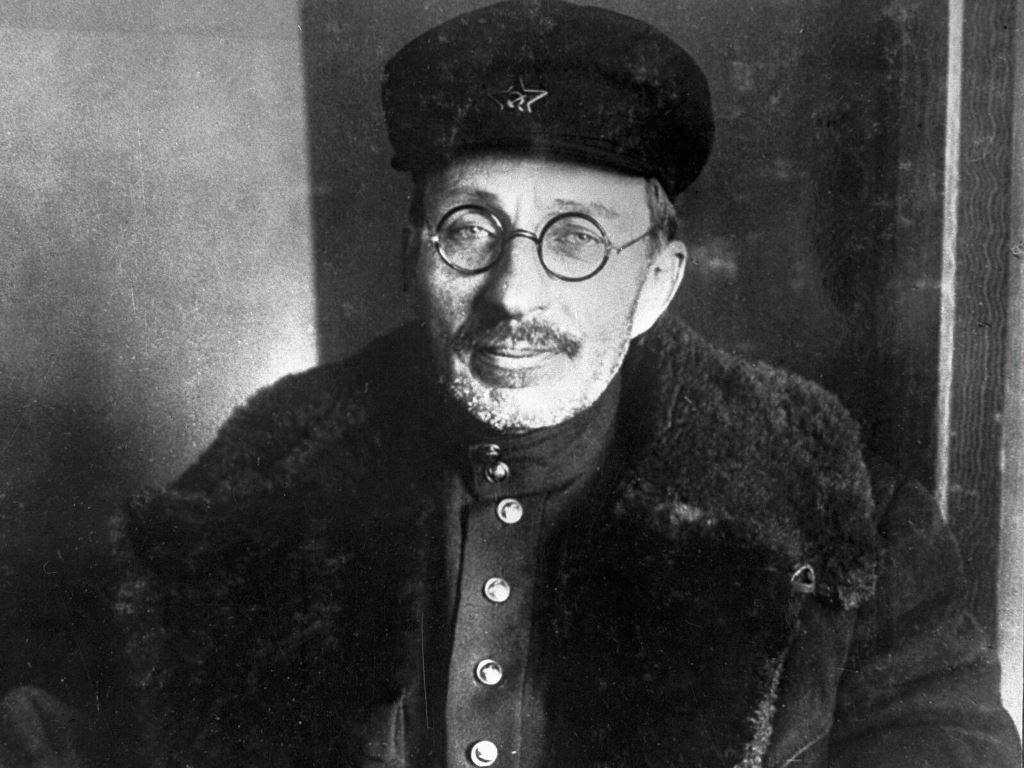
Anton Makarenko. Photo: RIA Novosti
Anton Makarenko, the developer of a unique pedagogical system, is widely known throughout the globe. The Pedagogical Poem (also known as The Road to Life) is his most prominent work. It has been translated into 36 languages. Anton Makarenko described the main principle of his system as follows: "A person should be treated with as many requirements as possible and with as much respect for him as possible." The result is self-explanatory: he brought up more than 3000 homeless children and juvenile delinquents, and none of them returned to prison.
"Family doesn't exist for him"
Anton Makarenko was born in a settlement at a railway station near the village of Belopolye in Kharkov Governorate 135 years ago, on March 13, 1888. His father was a painter in car shops but eventually managed to be promoted to head of the railroad car repair shop.
The Russian Empire's railways department cared about the social arrangements of its employees. Thus, quite good schools were opened for the children of workers and employees. That is why Anton and his younger brother Vitaly were able to finish school. Then, Anton joined the municipal college, and then took a one-year pedagogical course. Vitaly's choice was a military career. He fought in World War I, participated in the Brusilov offensive, and joined the Volunteer Army in 1917. In 1920, he managed to evacuate from Crimea. He spent the rest of his life in France and published the memoirs of his elder brother in 1970.
For Anton, the life of his siblings and parents was of very little interest to him. His father used to make bitter remarks that "the family does not exist for him; he comes here to change the underwear, have dinner, and sleep as if it were a hotel. He is not interested in anything else." Back then, books were the young man's primary passion. He used to spend all the money he had to buy them, often even on credit.
Having completed the teacher-training courses in 1905, Anton Makarenko worked as a teacher in a railway college. In 1914, the first Teacher Training Institute was opened in Poltava. He became a student having passed the entry exams with great success. He graduated from the institute with a gold medal. And his graduate work was titled "The Crisis of Modern Pedagogy".
He gave money and a gun to a thief
The revolution of 1917 made no particular changes in Anton Makarenko's life. Having graduated from the institute, he became head of the railway college. Later, he was the head of the municipal college in Poltava. In 1920, the young but experienced teacher was assigned by the Poltava Regional Public Education Department to establish a labor colony for correction education of homeless children and juvenile delinquents. The civil war was not yet over, the country was in ruins, and many children had been left without parents or a home. At that time, there were between 4.5 and 7 million homeless children in the country. Many of them begged and formed gangs of thieves to get a living and to survive. In 1920, prisons were overcrowded, and the authorities started taking measures to curb the spread of juvenile delinquency in the country. It was decided to open labor colonies for juveniles, where young offenders could be reformed and brought back to society as citizens with healthy morals.
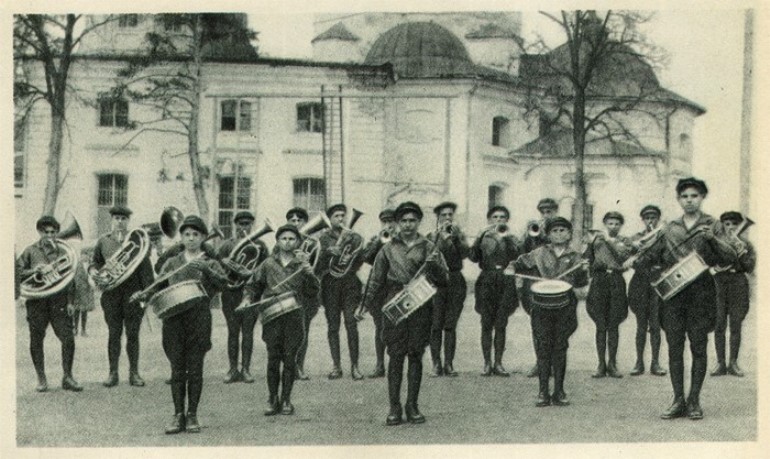
Orchestra in Anton Makarenko’s commune. Photo credit: mail.ru
As a matter of fact, a number of quite successful colonies and communes for teenagers were established during those years. The most famous one was the M. Gorky Colony. It was first opened near Poltava and later relocated to the Kharkov Region.
Anton Makarenko described his first impression of the new workplace in his Pedagogical Poem: there was a wild forest around, a few houses with little or no furniture, an axe, and a shovel as the tools, and tree teachers only, where two were women. The first residents were mature, nearly grown-up boys, who did not care a whit about the teacher's authority and saw the colony as a comfortable place to stay for the winter on the "government's provisions". They kept their lifestyle - stealing food from nearby villages, and playing "knifepoints" and cards. All suggestions to engage in study and useful work were resolutely rejected.
At that point, Anton Makarenko realized that everything he knew about pedagogical science, and the experience of the teachers of past years was of no help to him. "There are so many books, a lot of paper, a lot of praise! And at the same time, there is nothing. It is impossible to deal with one hooligan, there is no method, no tool, and no logic. There's simply nothing," he wrote in his memoirs.
The situation could not be dealt with by force. It would mean an open confrontation with an uncertain result. It was necessary to seek other ways and intervene through the mentality. At some point, the teacher found an unconventional solution. Semyon Kalabalin was the "authoritative" figure among the colony residents. He had fought in the Civil War and participated in armed robberies as a leader of a gang of thieves. Yet, since he had not committed any serious crimes, he was not sent to prison but was transferred to Anton Makarenko for reform. Thus, the teacher asked the former thief to go to town to collect money for their penal settlement. Having said that he trusted only him, Mr. Makarenko explained that if Semyon didn't come back, the whole settlement would be left without food and that the teacher could be simply executed by shooting. As a sign of special trust, he gave Semyon Kalabalin his own pistol so the latter could protect himself from possible robbers.
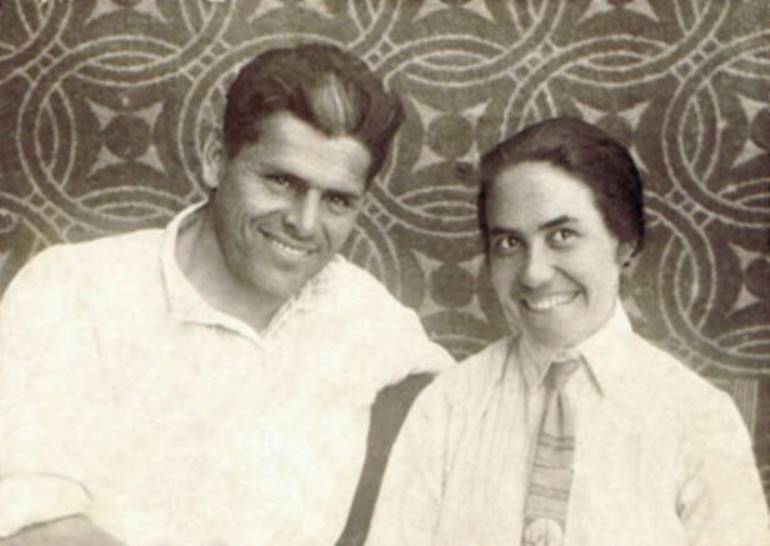
Semyon and Galina Kalabalin. Photo credit: wikipedia.org
Needless to say, the risk was extremely high. However, this absolute trust proved to be the key. Semyon was deeply moved by the responsible mission. He completed it and became a faithful assistant and then an associate of his teacher. He and his wife, also a trainee of the M. Gorky Colony, became the successors of Anton Makarenko's work. The Kalabalins brought up more than 15,000 children and teenagers in orphanages in Russia, Georgia, and Ukraine. They became second parents for many of their foster children.
"I demanded the upbringing of a well-tempered, strong person"
The colony was named after the famous writer Maxim Gorky for a reason. It is known that he paid quite a lot of attention to the need to work with homeless children and wrote a lot about it. In 1925, Anton Makarenko wrote a letter to his hero and told him about life in the colony. In 1928, Maxim Gorky visited the colony and spent a few days with its residents. They exchanged letters until Mr. Makarenko's relocation to Moscow in 1937.
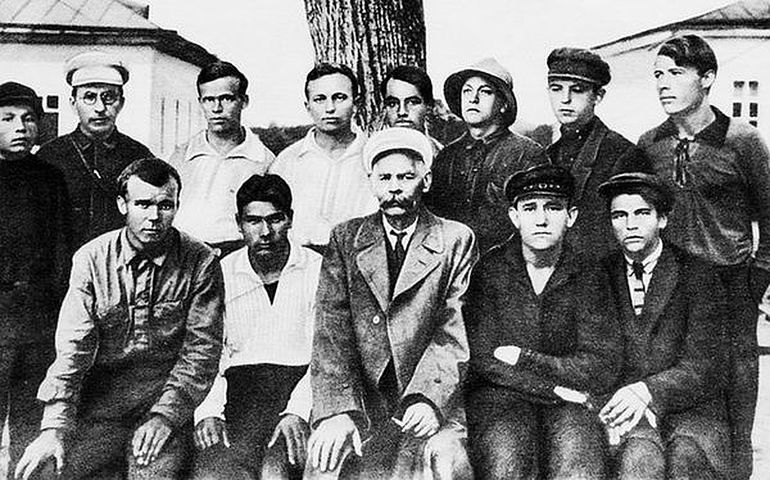
M. Gorky and A. Makarenko with the senior residents of the colony. June 1928. Photo credit: mediasole.ru
Truth be told, it did not help Anton Makarenko to avoid criticism from higher ranks. His work was adversely judged by Vladimir Lenin's widow, Nadezhda Krupskaya, who was in charge of youth education. The teacher was accused of insufficient education of class consciousness, as well as physical abuse. Although inspections failed to find any evidence of this, Anton Makarenko had to leave the M. Gorky Colony. He headed another juvenile facility in the suburbs of Kharkov, the Dzerzhinsky Commune.
Mr. Makarenko believed that labor was one of the most important educational tools. Residents of his first colony were engaged in agricultural work, such as growing vegetables, raising livestock, working in the blacksmith shop and carpenter's workshop, and improving the site.
Then, the Dzerzhinsky Commune did not have mere vegetable gardens. There were actual production facilities. In 1930, the labor department of the Kharkov Machine Building Institute was opened there. In 1932 the Electric Tool Factory was opened, and then the roll-film camera factory (the once-famous FED cameras were produced there). Since 1933, the commune was the first children's facility in the USSR to become fully self-sufficient.
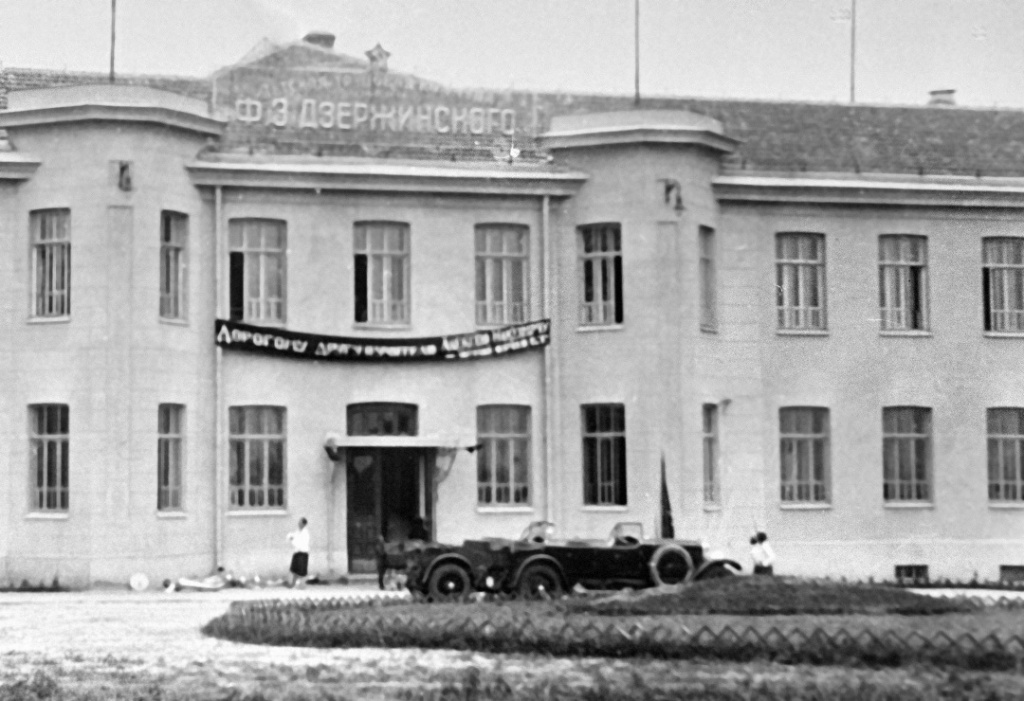
The building of the Dzerzhinsky Commune. Photo credit: Communary XXI / VK.com
In 1933, the commune was also visited by a delegation from France. The distinguished guests were impressed by the neatness and order, as well as the abundance of flowers. Actually, a greenhouse was the thing Anton Makarenko used to build. He planted only roses there. There were flowers in all the rooms and premises, such as bedrooms, dining rooms, classrooms, and even on the stairways! The tables in the dining rooms had white tablecloths instead of plastic sheets. Anton Makarenko believed that the need for aesthetics and neatness in children can be cultivated only through beauty. By the way, he demanded teachers come to work in their best clothes. And he also followed this requirement.
Self-management was the basis of discipline in the colony. All children were grouped into units. Each unit had a leader. The leader's position was not permanent - there was a rotation so that everyone could express his or her organizational talents. All important decisions were taken by the council of leaders of the units.
Mr. Makarenko was convinced that a well-developed personality can be brought up only within the community. If someone becomes lazy and does not do their part, the others would hardly allow this behavior for a long time. The money earned by such collective labor was distributed by the council of leaders who decided what should be purchased in the first place.
So, the children's community always had a goal to achieve. According to Mr. Makarenko, it was a system of perspective lines. "A person cannot live in the world if there is nothing joyful ahead for him. The true motivation of human activity is the joy of tomorrow. This joy of tomorrow is one of the most important targets in pedagogical methods. This is where the interesting transition is observed from the primitive satisfaction of some sort of gingerbread to the deepest sense of duty," Anton Makarenko wrote.
"Pedagogical Poem": the Summary
In 1935, Mr. Makarenko was transferred to Kiev. He worked as head of the department of labor colonies in the NKVD of the Ukrainian SSR for just over a year. The system saw an outbreak of arrests, including that of his immediate supervisor. Anton Makarenko was on the list for arrest; however, his name was removed by the People's Commissar Vsevolod Balitsky who favored the talented educator. In his letter to Maxim Gorky, Anton Makarenko wrote, “There is one more thing – I am fed up with Ukraine. I have always been just a Russian man, and I love Moscow.” Maxim Gorky helped with his relocation and purchase of an apartment in a writers’ building on Lavrushinsky Lane.
Mr. Makarenko showed his first literary trials to Mr. Gorky. The latter recommended the teacher keep writing. The Pedagogical Poem, the major and globally-known work by Anton Makarenko was completed ten years later. It was translated into 18 languages of USSR ethnic groups and 36 languages of the world. Maxim Gorky commented on it as follows, “This is a true pedagogical poem, the inspirational book on reforming the mentality. It is like Emile, Or Treatise on Education by Jean-Jacques Rousseau, that is a developmental stage for science and education.”
Anton Makarenko also wrote Flags on the Battlements, Paths of Generation, and Honor. However, he unexpectedly died of a heart attack traveling home from the Art Center by train in 1939. He was just 51.
The result of Anton Makarenko's pedagogical work can be literally described as fantastic. Official data shows that none of his more than 3,000 pupils turned to crime again. They all became part of society and found their paths in it. Many of them got higher education and became engineers, doctors, economists, pilots, and managers. There were those, like Semyon Kalabalin and his wife, who continued the work of their teacher.
UNESCO recognized Anton Makarenko as one of the four world scientists who had the greatest impact on the pedagogical system in the twentieth century. The great educator gave such simple advice on raising children, “You can be formal with them to the utmost degree, and demanding to the point of being picky, you can ignore them... but if you are brilliant in your work, your knowledge, your luck, then do not need to look back. You can be sure that they are on your side... Conversely, no matter how affectionate, entertaining in conversation, kind, and friendly you are... if your work is accompanied by setbacks and failures if you show that you do not know your work at every turn... you will never deserve anything but disdain.”
New publications

 Mikhail Kalatozov, a director who transformed the world of cinematography in many ways, was born 120 years ago. He was a Soviet film official and a propagandist. Above all, he was capable of producing movies that struck viewers with their power and poetic language.
Mikhail Kalatozov, a director who transformed the world of cinematography in many ways, was born 120 years ago. He was a Soviet film official and a propagandist. Above all, he was capable of producing movies that struck viewers with their power and poetic language.  Ukrainian authorities have launched a persecution campaign against the canonical Ukrainian Orthodox Church (UOC), the biggest one in the country's modern history. Over the past year, state sanctions were imposed on clergy representatives, searches were conducted in churches, clergymen were arrested, criminal cases were initiated, the activity of the UOC was banned in various regions of the country, and monasteries and churches were seized.
Ukrainian authorities have launched a persecution campaign against the canonical Ukrainian Orthodox Church (UOC), the biggest one in the country's modern history. Over the past year, state sanctions were imposed on clergy representatives, searches were conducted in churches, clergymen were arrested, criminal cases were initiated, the activity of the UOC was banned in various regions of the country, and monasteries and churches were seized.  When Nektary Kotlyaroff, a fourth-generation Russian Australian and founder of the Russian Orthodox Choir in Sydney, first visited Russia, the first person he spoke to was a cab driver at the airport. Having heard that Nektariy's ancestors left Russia more than 100 years ago, the driver was astonished, "How come you haven't forgotten the Russian language?" Nektary Kotlyaroff repeated his answer in an interview with the Russkiy Mir. His affinity to the Orthodox Church (many of his ancestors and relatives were priests) and the traditions of a large Russian family brought from Russia helped him to preserve the Russian language.
When Nektary Kotlyaroff, a fourth-generation Russian Australian and founder of the Russian Orthodox Choir in Sydney, first visited Russia, the first person he spoke to was a cab driver at the airport. Having heard that Nektariy's ancestors left Russia more than 100 years ago, the driver was astonished, "How come you haven't forgotten the Russian language?" Nektary Kotlyaroff repeated his answer in an interview with the Russkiy Mir. His affinity to the Orthodox Church (many of his ancestors and relatives were priests) and the traditions of a large Russian family brought from Russia helped him to preserve the Russian language.

 The leaders of the Friends of the Great Russia cultural association (Amici Della Grande Russia) in Italy believe that the Western policy of abolishing Russian culture in Europe has finally failed. Furthermore, it was doomed to failure from the beginning.
The leaders of the Friends of the Great Russia cultural association (Amici Della Grande Russia) in Italy believe that the Western policy of abolishing Russian culture in Europe has finally failed. Furthermore, it was doomed to failure from the beginning.  Name of Vladimir Nemirovich-Danchenko is inscribed in the history of Russian theater along with Konstantin Stanislavski, the other founding father of the Moscow Art Theater. Nevertheless, Mr. Nemirovich-Danchenko was a renowned writer, playwright, and theater teacher even before their famous meeting in the Slavic Bazaar restaurant. Furthermore, it was Mr. Nemirovich-Danchenko who came up with the idea of establishing a new "people's" theater believing that the theater could become a "department of public education."
Name of Vladimir Nemirovich-Danchenko is inscribed in the history of Russian theater along with Konstantin Stanislavski, the other founding father of the Moscow Art Theater. Nevertheless, Mr. Nemirovich-Danchenko was a renowned writer, playwright, and theater teacher even before their famous meeting in the Slavic Bazaar restaurant. Furthermore, it was Mr. Nemirovich-Danchenko who came up with the idea of establishing a new "people's" theater believing that the theater could become a "department of public education."  "Russia is a thing of which the intellect cannot conceive..." by Fyodor Tyutchev are famous among Russians at least. December marks the 220th anniversary of the poet's birth. Yet, he never considered poetry to be his life's mission and was preoccupied with matters of a global scale. Mr.Tyutchev fought his war focusing on relations between Russia and the West, the origins of mutual misunderstanding, and the origins of Russophobia. When you read his works today, it feels as though he saw things coming in a crystal ball...
"Russia is a thing of which the intellect cannot conceive..." by Fyodor Tyutchev are famous among Russians at least. December marks the 220th anniversary of the poet's birth. Yet, he never considered poetry to be his life's mission and was preoccupied with matters of a global scale. Mr.Tyutchev fought his war focusing on relations between Russia and the West, the origins of mutual misunderstanding, and the origins of Russophobia. When you read his works today, it feels as though he saw things coming in a crystal ball...